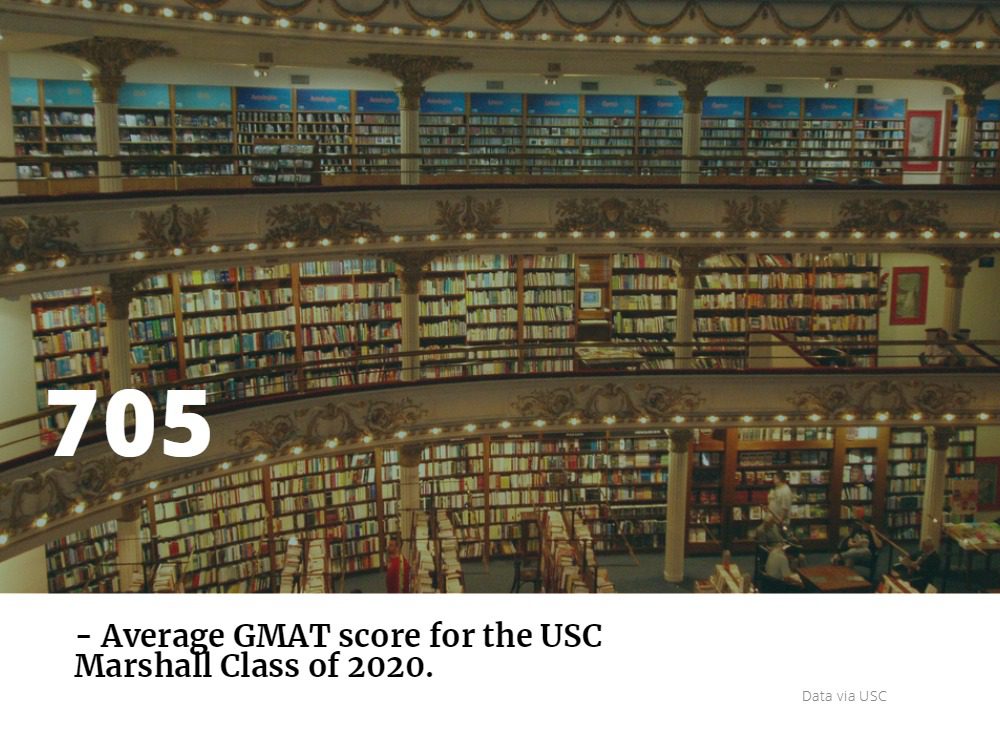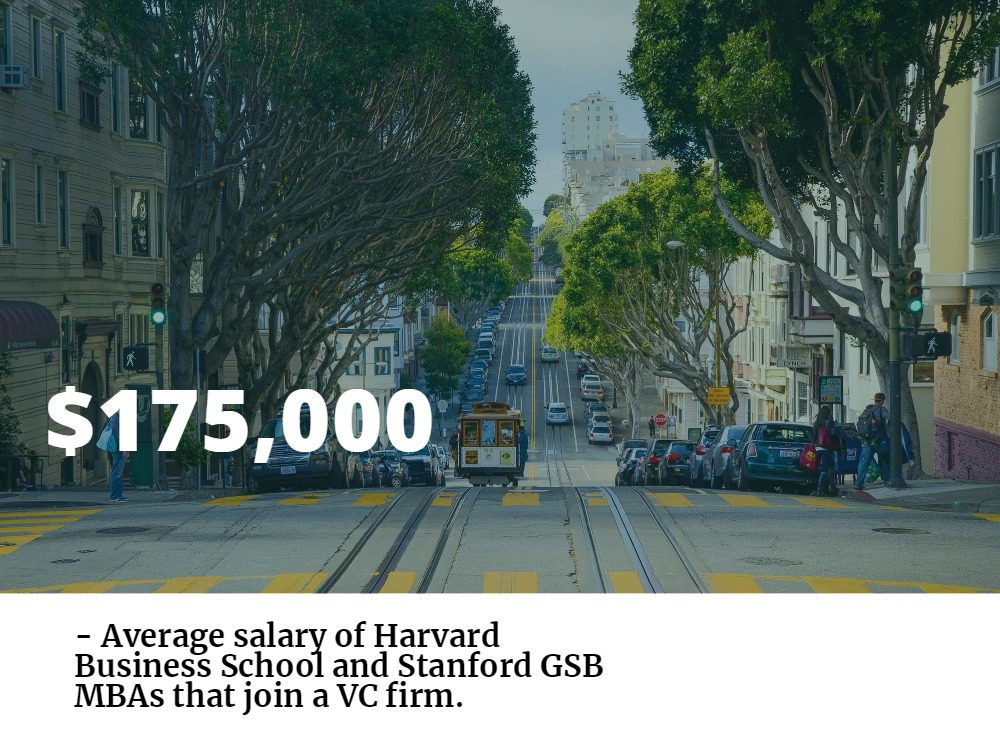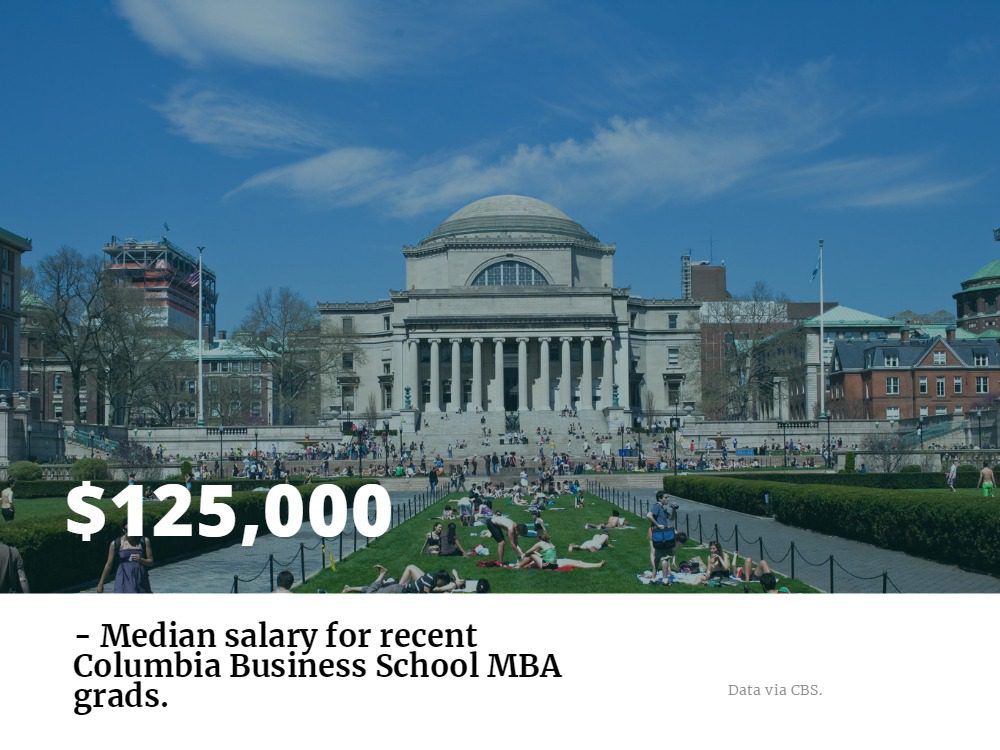Search results for mba recruiters:
New MBA Jobs: Morgan Stanley, Google, Nike, and More
Every MBA’s goal is to land their dream job, but why limit your choices to the United States? With so many great companies recruiting MBAs to develop businesses in markets across the globe, it’s hard to stay on top of all the opportunities out there. Here’s a selection of some of the most exciting open positions out there right now in the US, Europe and Asia: Continue reading…
Inside the History-Making Full-Time MBA Class of 2020 at USC Marshall
Announced at the end of July, the incoming full-time MBA Class of 2020 at the USC Marshall School of Business is making headlines across the country. Graduating exactly 100 years after the business school’s first cohort, the USC Marshall MBA Class of 2020 has made history as the first cohort at a top-ranked business school to feature more women than men.
Even without history-making demographics, the new 2020 cohort is a diverse group. Two-hundred and twenty one of the 2017 applicants were accepted, making an acceptance rate of 28 percent. The students come from a wide variety of backgrounds, and though the majority (25 percent) had an undergraduate major of business/commerce, also present are students with undergraduate degrees in engineering/computer science (18 percent), the humanities (17 percent), and economics (16 percent). At an average age of 28 years, the new USC students have an average of five years of work experience.
A look at the academic profile of the typical USC student reveals the programs competitive nature and commitment to rigorous academics. On average, incoming students had an undergraduate GPA of 3.50 and a GMAT score of 705.
In addition to gender, diversity represents itself in the 2020 cohort through the 30 percent of international students, representing 31 different countries around the world, including Iran, Israel, Ethiopia, Egypt and Pakistan, to name a few. About 21 percent of students from the United States are also made up of underrepresented minority groups.
Of course, the school’s achieving of gender parity is probably the most notable thing about this incoming class. Women have always been an underrepresented group within business and business schools—according to the AACSB, between 2012 and 2017 the number of women working towards full-time MBA degrees was below 38 percent. This reveals a huge contrast for women MBAs versus those in other graduate degree programs, where women make up over 50 percent of most graduate classes.

An overall look at the USC Marshall MBA Class of 2020 already reveals the ways more women in a program can have a broader impact on the school and the student’s future careers. “This year’s applicant pool was the strongest in our program’s history,” commented assistant dean and full-time MBA director at Marshall, Evan Bouffides. “They brought the highest GMAT score and the highest average GPA. The women in particular were extraordinarily well prepared.”
There may be a number of reasons why the number of women in MBA programs has historically remained low. Different studies have looked at factors like the time it takes to complete an MBA degree, work experience required, and the overall return on investment. Reasons may also reflect the gender pay gap, which makes the return on investment significantly lower for women, who studies show could make anywhere from 3 percent to 36 percent less than their male counterparts.
YOU MAY ALSO LIKE: The Best U.S. Employers for Women
Thankfully, schools like USC understand the benefits that women MBA graduates can add both to the school and workforce. Over recent years, the university has taken purposeful measures to increase gender diversity among applicants, such as programming focused on women. The investment of creating diversity at business schools mirrors an overall focus on diversity throughout the business world, which means that schools like Marshall can get ahead of the game in creating a diverse and appealing talent pool for employers.
“With more than 50 percent of our 2020 class women, it gives us a talent pipeline that employers are hungry to tap into as they go about increasing the diversity of their executive staffs,” said Mark Brostoff, Assistant Dean and Graduate Career Services Director at Marshal. “Recruiters are very happy with this great news.”
Finding the Best MBA Internship Destinations in the Pacific Northwest
The Pacific Northwest MBA job market has been rapidly expanding for years. The region is packed full of corporate giants, technology startups, and many more lucrative companies MBAs know fully-well, such as Starbucks, Amazon, Boeing, and Microsoft. Continue reading…
Best MBA Internship Opportunities in the Northeast
There’s no doubt that summer internships play a critical role in an MBA student’s education and career. Not only do internships provide students with the opportunity to gain hands-on experience in the workforce, but they’re also known for helping students develop professional connections and earn top-tier salaries.
But not all internships are made equal, especially for talented business school prospects. For example, working at Apple would likely have a very different effect on an MBA’s resume than working for a small, unknown startup company down the street. And if you’re looking at the top cities across the U.S. where companies actively recruit talent, you can’t go wrong with Boston, New York City, or Philadelphia for your location. But which is the best?
In this article, we highlight the top internship destinations in each city along with the top two schools in each area that will get you where you want. Continue reading…
MBA Job Destinations: Wolters Kluwer
The average person may not know what international information services firm Wolters Kluwer does, or even how to pronounce it But when it comes to post graduate job placement, every MBA knows (or should know) the Dutch company’s name, and its status as a top MBA recruiter. Continue reading…
Hot MBA Jobs: Venture Capital Associate
If you’ve ever used an app like Uber or Snapchat, odds are you’ve benefited from the work of a venture capital associate. Through skills like financial modeling, evaluations, and a little bit of luck, venture capital associates find ‘the next big thing’ and provide the money to make it happen. And though not all of these skills can be taught, top venture capital firms are looking to business programs to find the perfect candidate.
For students looking to join the venture capital industry, the path isn’t always an easy one. The level of experience required in the field means that very few students find venture capital associate positions straight out of their MBA programs. This doesn’t seem to deter those who are ready to work for it, however. Last year, private equity was ranked as the second-biggest employer for MBA graduates at the Harvard Business School.
Before you get started on the road to becoming a venture capital associate, let’s take a look at what the path to your dream job might look like.
The Venture Capitalist Job Role
Venture capital (VC) firms take on the risky but often lucrative job of searching the startup world for the next big thing. In exchange for providing capital infusions to startup companies in the early stages of their business, venture capitalists receive both oversight and ownership in the company.
For associates at venture capital firms, the job primarily involves sourcing new deals—setting up meetings with entrepreneurs and companies to find prospective investments—and supporting existing ones. As most roles in financial analysis go, VC associates are responsible for supporting all aspects of an investment, from the initial sourcing, modeling, and execution of a deal.
The exact type of work done by a VC associate may be determined by the type of for it is. For firms more focused on funding startups in their early stages, the associates work may be more concentrated on sourcing, while firms working more on late-stage financing will likely require more diligence and modeling from its associates.
Venture Capitalist Salary
While the exact roles of a venture capital associate may vary widely with the firm and its specialization, the general trend shows VC work to be an incredibly lucrative career. In 2016, graduates from top MBA programs like Stanford GSB and Harvard Business School joined VC firms at an average salary of $175,000.
According to Payscale, the average salary across all education levels for an associate at a venture capital firm is $92,067. The level of experience can make a big difference when it comes to the venture capital associate role, as well. Mid-career professionals in this role make on average 24 percent more than the national average, and experienced professionals up to 51 percent more.

Where Do Venture Capital Associates Work?
Venture capital firms can be found throughout the world in a variety of fields, leaving a wide range of opportunities open to up and coming VC associates. Certainly, studying and working near concentrated start up hubs like the Silicon Valley in California or the UK’s Silicon Fen can help boost an MBAs ability to get their foot in the door.
Still, a quick look at open venture capital associate positions open at the time of writing reveal diverse offerings spread throughout the country, from Palo Alto, CA to Philadelphia, PA to Durham, NC. MBAs looking to pursue a role in venture capitalism may also look for roles that allow them to pursue other areas of business they are passionate about, since VC firms are typically specialized in the type of startup they will invest in, be it fintech, health science, and other various fields.
Some of the world’s top corporations also have venture capital firms that will invest in companies related to their work. This includes companies like Google, Intel, Salesforce, Johnson & Johnson, and more.
The Venture Capital Associate Education
VC firms looking for associates are likely looking for MBAs who have had some previous experience on the workforce. While it’s not impossible for those without MBA degrees to begin as associates, opportunities for advancement to a partner level role are typically unusual without one. Typically, pre-MBA associates are expected to only work two to three years at a firm and then move on.
For post-MBA associates, it’s expected that these individuals will be working towards a partner level position. Firms will be looking for candidates with strong records in analysis who can demonstrate a deep understanding of markets and industries. Given that even MBA graduates will be expected to have a certain level of experience before joining a VC firm, these roles can be incredibly competitive. On-campus recruiting is uncommon for these firms, and typically only graduates from top level MBA programs are recruited to these positions. Basically, if you are determined to enter the venture capital industry, you will not only need an MBA education- you will need to prove you have the best MBA education.
The Top VC MBA Programs
To join the incredibly competitive field of Venture Capitalism, MBA graduates need a demonstrated record of financial analysis skills and a degree with the reputation to back it up. Some of the top schools for those looking to enter the VC or private equity fields overlap with some of the highest ranked MBA programs in the world. Schools that have strong relationships with investment banks and those with strong finance programs will likely offer the most opportunities for students looking for careers as VC associates. Some of the top schools for the field are listed below:
- Booth School of Business – University of Chicago: The full-time MBA program at University of Chicago’s Booth School of Business has a strong focus on venture capital and private equity through the Polsky Center for Entrepreneurship. The program provides strong networking opportunities for their MBAs through student organizations like the Entrepreneurship and Venture Capital (EVP) Group. The group offers career development, networking, activities, and speakers covering the most important topics in venture capital today.
- Kellogg School of Management – Northwestern University: MBA students at the Kellogg School of Management will find a huge focus on venture capitalism through the school’s Heizer Center for Private Equity and Venture Capital. Part of the center is the school’s Venture Lab, an experiential learning course that allows students hands-on experience with a quarter-long internship at venture funds, incubators or start-ups.
- Harvard Business School: The top-ranked Harvard Business School has one of the highest success rates in the world for students interested in venture capitalism. In 2015, roughly 14 percent of HBS graduates went into positions at private equity or venture capital firms. Organizations like the Venture Capital & Private Equity Club– which provides a speaker series, career treks, and an annual conference—allows students to get acquainted with the industry long before graduation.
Top MBA Internship Opportunities in the London Metro
As a center for global commerce and business, London is one of the top cities in the world to earn an advance business degree and secure an MBA internship. Continue reading…
The Highest Paying MBA Internships You Can Find
An MBA education can open the door to an astounding number of lucrative opportunities before you’ve even completed your degree. Many MBA interns are earning hourly wages unfathomable to the larger majority who spent their undergrad internships restocking break rooms and memorizing coffee orders, all for a whopping $0 per hour. Below, we’ve laid out the highest paying internships in some of the most common industries for MBAs.
Stats for MBA interns on Management Consulted dwarfed most other intern salaries. Though the reality of management consulting may lack the seedy glamor portrayed by Don Cheadle and Kristen Bell in House of Lies, these numbers are certainly compelling enough on their own to keep the attention of ambitious young interns.

Deloitte, a consistent top hirer of MBA’s according to Fortune, may be a top destination for MBA interns as well, if compensation is any indication. In 2016, MBA’s at Deloitte make an average of $11,380 per month for a ten-week internship, with the opportunity to receive full second year tuition reimbursement for returning interns. Depending on their goals, interests, and professional backgrounds, interns join a client service team in Deloitte & Touch LLP, Deloitte Tax LLP, Deloitte Risk and Financial Advisory, or Deloitte Consulting LLP.

Management Consulted put the average MBA intern salary at A.T. Kearney at a staggering $11,500 per month. A.T. Kearney offers a ten-week summer internship, during which interns will have unique experiences, such as a three-day opportunity in the middle of the summer to converge in a single location with all of the season’s interns. During these three days, students have the opportunity to network, socialize, and learn about the different facets of the company.
Outside of consulting, there are plenty of opportunities for MBA interns. It is no secret that some of the highest paying jobs out there are in tech. Luckily, there is a sizeable demand for MBA’s at tech companies.

Despite the recent, um, controversy surrounding Facebook’s security practices, the social networks interns are making out well. Facebooked topped Glassdoor’s list of Highest Paying Internships in 2017, with a median monthly salary of $8,000. The 12-week business internships offer frequent Q&A’s with higher-level employees and the opportunity to tackle real problems that face the social networking platform.

It would be remiss to talk about MBA’s in tech without mentioning Amazon, which is fast becoming one of the largest MBA tech recruiters. With a median monthly pay of $6,400, Amazon also made Glassdoor’s list of Highest Paying Internships in 2017. Keep in mind, this number is the median for all Amazon interns, and does not factor in MBA education, which would likely yield a much higher number. Interns are assigned a strategic project that provides the opportunity to contribute to solving a real business issue. Additionally, an internship with Amazon is often a foot in the door to a full-time career with the internet retail giant. Amazon’s website encourages MBA’s to apply, stating:
“You will have the autonomy to think strategically, make decisions, and drive significant impact to the customer experience and the business. To be successful, you must be passionate about the business, flourish in ambiguity, and demonstrate nimble leadership.”

Two Sigma Investments, a relatively young investment management company, has been getting a lot of press for its generous internship compensation. According to Business Insider, the $40 billion hedge fund, which started in 2001, grew 400 percent from 2012-17. The 10-week internships can pay upwards of $10,500 per month. Internships at Two Sigma are primarily in STEM, and MBA’s with an interest in Quantitative Research might find this program particularly rewarding.
Your Essential Guide to Pre-MBA Diversity Conferences, Boot Camps, and Forums
Several organizations are focused on helping increase the pipeline of underrepresented demographics—such as women, LGBTQ students, and those from diverse cultural and ethnic backgrounds—to business school and the larger business world. As part of these efforts, many host MBA diversity conferences, boot camps, and forums providing recruiting and networking opportunities to admitted students headed off to business school in the fall. For eligible participants, these opportunities, designed to provide a head start for students in the MBA recruiting process before they even arrive on campus, are well worth pursuing.
Forté MBA Women’s Leadership Conference
 The Forté Foundation, a non-profit consortium of leading companies and top business schools, works specifically to expand opportunities for women in business through a range of financial and educational opportunities. A centerpiece of these efforts is the annual Forté MBA Women’s Leadership Conference, which will take place this year in Atlanta on June 15 and 16. Registration is now open for both current business school students and those slated to start their MBA programs next fall.
The Forté Foundation, a non-profit consortium of leading companies and top business schools, works specifically to expand opportunities for women in business through a range of financial and educational opportunities. A centerpiece of these efforts is the annual Forté MBA Women’s Leadership Conference, which will take place this year in Atlanta on June 15 and 16. Registration is now open for both current business school students and those slated to start their MBA programs next fall.
The two-day conference provides an opportunity for women pursuing their MBA to connect with hundreds of other like-minded students. Billed as a chance to “learn from highly successful business leaders how to develop stand-out skills and project an authentic leadership style,” it also presents valuable networking opportunities. Highlights of this year’s conference include a meet and greet with Fortune 100 recruiters, more than 150 speakers and presentations from a variety of industries and career paths, and a keynote lecture by USA Today Editor-In-Chief Joanne Lipman. Conference attendees can also take part in the Forté Power Pitch Competition, pitching their ventures to a panel of judges for a chance at cash prizes.
Reaching Out MBA Conference
 LGBTQ+ students and their allies should familiarize themselves, if they are not already, with Reaching Out MBA (ROMBA). This organization focuses on educating current and prospective MBA students on LGBTQ-specific issues and connecting current LGBTQ students with each other and with alumni communities.
LGBTQ+ students and their allies should familiarize themselves, if they are not already, with Reaching Out MBA (ROMBA). This organization focuses on educating current and prospective MBA students on LGBTQ-specific issues and connecting current LGBTQ students with each other and with alumni communities.
“The conference connects more than 1,600 members of the LGBTQ MBA student and alumni community with more than 90 companies looking specifically or LGBTQ talent,” ROMBA Executive Director Matt Kidd explains. Registration is now open for this year’s conference, which will take place in Minneapolis on October 4th through 6th.
ROMBA also helps prepare students in advance of the conference. “We want to ensure they are well positioned for their conversations with our corporate partners at the conference and beyond,” Kidd adds. ROMBA also offers pre-admission mentoring, a summer consulting project, and webinars designed to help students gain a full understanding of the industries represented at the conference.
MBA JumpStart
 Unlike Forté and ROMBA, which focus on specific student demographic groups, other organizations offer pre-MBA opportunities for students from a range of diverse backgrounds. One such organization, JumpStart Advisory Group (JSAG), provides an array of resources and tools through its ongoing Diversity Forums.
Unlike Forté and ROMBA, which focus on specific student demographic groups, other organizations offer pre-MBA opportunities for students from a range of diverse backgrounds. One such organization, JumpStart Advisory Group (JSAG), provides an array of resources and tools through its ongoing Diversity Forums.
JumpStart will host its Brand Management and Marketing Diversity Forum in Philadelphia on May 20th and 21st and its Financial Services and Consulting Diversity Forum in Chicago from July 10th through 13th. In Chicago, finance will be the focus on Tuesday and Wednesday and consulting on Thursday and Friday, although enrolled students interested in learning about both industries can choose to attend the entire event.
“Selected students from top-tier MBA programs attend industry-specific workshops, are introduced to case studies, and are provided with endless opportunities for networking with corporate partner representatives and other incoming MBA students prior to matriculation,” according to the JumpStart website. Students interested in attending should apply here by May 13.
“Diversity for MBA JumpStart is defined as individuals that are under-represented in business including women, Black, African-American, or of African descent, Hispanic, Latin-American, or of Latin descent, Native American or American Indian, Asian and Pacific Islander,” the website notes.
School-Year Fellowship Opportunities
In addition to pre-MBA conferences and workshops, students from diverse backgrounds can also apply for a range of fellowship opportunities once they have been admitted to a leading MBA program.
The Toigo Foundation, which is focused on the finance industry, aims to prepare under-represented MBA students for leadership roles and help foster environments where diverse students can thrive during and after their MBA. Recipients of the Toigo Fellowship participate in two weekends of intense training during each year of their MBA program. These training sessions include leadership development and mentoring, networking opportunities, and the chance to make lasting connections across a range of financial industries. Applications are due by April 30, and financial awards vary depending on achievement and financial need. “The selection of each year’s class of Toigo Fellows is a fluid process and not limited to a specific number,” notes the Tioga website. “Recently, we have selected as many as 80 students (from our applicant pool of nearly 400) to become Toigo Fellows.”
In addition to the nonprofit organizations listed above, many well-known corporations also offer fellowship programs of their own that include financial assistance, conferences, and bootcamp-style experiences for students of color, LGBTQ students, and students with disabilities.
For example, Bank of America Merrill Lynch offers a $40,000 fellowship toward first-year tuition as well as a paid summer internship and opportunities for additional funding in the second year of business school. Goldman Sachs features a similar MBA fellowship program that provides funding to cover first-year tuition, a guaranteed summer associate salary, and a signing bonus that carries an additional $40,000 award upon acceptance of a post-MBA full-time offer. To learn about even more corporate MBA fellowship opportunities, click here.
Now, we understand completely that the thought of another application process on the heels of applying to business school may seem groan-worthy to many. But for students from diverse backgrounds, exploring the opportunities presented as part of these pre-MBA diversity conferences, boot camps, forums, and fellowship programs can certainly make the additional effort pay off.
This article has been edited and republished with permissions from our sister site, Clear Admit.
The 5 Highest Paying Marketing Jobs for MBAs
Marketing is one of the most popular career paths for an MBA—2.9 times as popular as other careers according to PayScale—and with good reason: about 69 percent of marketing MBAs report a high level of job satisfaction. Besides, marketing MBAs are paid well. While the starting median pay (with a max of five years of experience) is only $55,700, after ten years, pay jumps to $116,000—a 108 percent growth between starting and mid-career salary.
The question then is, “What are the highest paying marketing jobs for MBAs?” The answer isn’t as cut and dry as you would think. It varies significantly between companies, level of experience, location, and job type.
Companies Recruiting Marketing MBAs
Where you work can have as a profound of an impact on your pay as your actual job function. That’s because larger companies tend to pay higher salaries, and how a particular company views the marketing department can also influence how much they are willing to pay. Below are five of the highest paying marketing jobs, according to PayScale.
- Microsoft Corp: $95,146 – $152,605
- IBM Corp: $91,158 – $132,500
- Dell, Inc: $77,511 – $130,000
- Starbucks Corp: $115,436 – $121,097
- Amazon: $90,000 – $122,500
Experience
According to PayScale, experience plays a big role in how much you earn as a marketing professional. After graduating with an MBA in business and marketing, the average salary you can expect based on your years worked is:
- Less than one year: $54,721
- One to four years: $59,343
- Five to nine years: $81,097
- Ten to 19 years: $104,070
- Over 20 years: $124,631
Location
Where you work, can have a significant impact on what you’re worth. As always, large cities tend to pay more, but that’s still not always a guarantee. So, where are the most popular cities for marketing professionals and how much do they pay (average salary)?
- Seattle, WA: $119,266
- San Francisco, CA: $118,330
- Boston, MA: $104,217
- Dallas, TX: $100,237
- NYC, NY: $96,387

The Top MBA Marketing Jobs
There are dozens of different marketing positions that an MBA graduate can choose. If you’re looking to choose the highest paying marketing job, then you’ll want to choose one of the following five jobs. These are the top salaried positions for marketing MBAs (just be sure to keep in mind the company, location, and your experience if you want to earn the most money).
-
Vice President Marketing ($100,000 – $186,000)
As a Vice President of Marketing, you will offten be responsible for reporting your company’s marketing efforts to the board of directors or other highly-placed executives. Your main responsibility will be to determine the best strategies to improve your market-shares for goods and services sold. You’ll also be responsible for your company’s brand, including presenting the company’s assets and products. Common tasks include:
- Forecasting and strategic planning.
- Directing and setting the strategic direction of the marketing program.
- Overseeing all marketing staff operations, policies, and plans.
For MBA graduates, becoming a VP of Marketing is the highest paying position you can attain. On average, you’ll earn $143,571 plus a bonus between $4,939 and $49,935. As for where you’ll get paid the most, look for jobs in:
- San Francisco: 21 percent more
- Charlotte: 11 percent more
- Boston: 10 percent more
-
Marketing Director ($66,000 – $158,000)
Marketing Directors are responsible for managing and directing all marketing tasks. You’ll oversee the many marketing professionals under your purview and ensure that they meet company goals, requirements, and needs. In addition, you’ll be responsible for developing marketing projects, running successful marketing campaigns, monitoring budgets, resolving team issues, and communicating with clients, vendors, and other team managers within your company. Common tasks include:
- Overseeing marketing staff, advertising budget, and business planning.
- Directing and planning marketing strategies.
- Acting as the marketing subject matter expert.
On average, a Marketing Director with an MBA can expect to earn $106,684. However, that salary can greatly increase depending on the company you work for. The top companies are:
- Medtronic, Inc: $175,000
- Microsoft: $164,848
- IBM: $147,215
-
Senior Marketing Manager ($73,000 – $147,000)
As a Senior Marketing Manager, you’re in a middle-management position. Typically, you report to the Marketing Director and are responsible for researching target markets, providing feedback on product development, running product teams, planning display marketing, and working with various other teams to develop marketing objectives and goals. Common tasks include:
- Managing training and development of marketing staff.
- Managing and analyzing marketing programs for optimized results.
- Developing, recommending, and implementing marketing programs and campaigns.
On average, you can expect to earn $111,476. To earn the most, you’ll want to look at jobs at:
- Microsoft: $138,598
- Medtronic, Inc: $128,104
- Amazon.com: $126,774
-
Brand Manager ($68,000 – $132,000)
As a Brand Manager, you’ll be responsible for many of the customer-facing operations in the marketing department. Your job will be to control and manage all the ways that the company is exposed to the public including consumer attitudes, staff communication, and more. Common tasks include:
- Leading the brand strategy.
- Researching customer attitudes and developing plans and projects to support positive experiences.
- Leading consumer communication in each marketplace.
On average, a Brand Manager earns $102,309 as an MBA graduate with a yearly bonus between $795 and $19,644. To earn the most money, you’ll want to work in:
- San Francisco: 41 percent more
- Seattle: 36 percent more
- Chicago: 16 percent more
-
Product Marketing Manager ($60,000 – $130,000)
A Product Marketing Manager knows the company’s products inside and out. They are responsible for conducting research and determining a strategy for selling each product to generate the highest revenues. You’ll also be responsible for overseeing how each product is seen by the public from advertising to press releases and more. Common tasks include:
- Developing product marketing strategies to maximize revenue.
- Researching consumer opinions on products to aid performance.
- Collaborating with design to meet consumer expectations.
On average, a Product Marketing Manager will earn $105,942, which is pretty consistent between companies. The best paying companies are:
- Google: $115,723
- Microsoft: $115,481
- AT&T: $112,020
A Look At New York’s Best Real Estate MBA Programs
In 2017, the United States Commercial Real Estate Services group (CBRE), listed New York City’s real estate investments markets among the three largest in the world, sandwiched between Tokyo and Los Angeles. This makes New York City the perfect place to learn about the multi-faceted, constantly-evolving field of real estate. For aspiring MBA’s interested in pursuing real estate, we’ve laid out some of the best New York real estate MBA programs the metro has to offer.
The Best New York Real Estate MBA Programs
Columbia Business School
The oft-celebrated Columbia Business School MBA Real Estate Program emphasizes finance and investment management, headquartered at the Paul Milstein Center for Real Estate. There, according to the school, students will gain an education focused on “capital markets, entrepreneurship, and global business.” Since many of Columbia’s alumni remain in New York metro, the school has access to a large network of professionals to engage in speaking events, panels, and mentorship with current students. Students in this program must take Real Estate Finance, which the school considers the Real Estate program entry course. Students then take nine credits of real estate electives.
The Real Estate Private Equity class lets students gain real-world experience. Groups of students work with industry sponsors to develop a business plan and present their final projects to a panel of professionals. Given the hands-on private equity and investment experience provided by this course, it makes sense that in 2017, 46 percent of students who graduated from the MBA Real Estate program went on to careers in Investment Management/Private Equity.
Nearly 4 percent of the most recent MBA class from CBS entered the New York real estate industry, earning a median income of $120,000 per year and, of course, heavy amounts of extra compensation. These graduates earned positions at notable real estate firms, such as: Drake Real Estate Partners, GLL Real Estate Partners, Greystar Real Estate Partners, LLC, Summit Real Estate Group, LLC, TKF Real Estate Investment LLC, and Trilogy Real Estate Management.

SC Johnson Graduate School of Management – Cornell University
At the Cornell University SC Johnson Graduate School of Management, students can pursue a dual degree in real estate and business administration. The MPS in Real Estate/MBA is a collaboration between Cornell SC Johnson’s School of Hotel Administration and Johnson. The dual degree spans six semesters (three years), and includes two summer internships. The first year of the degree is in either the real estate program or the MBA program, but students can take courses in both programs in the following semesters.
Students pursuing real estate at Cornell benefit from access to the the Cornell Real Estate Council, which the school promotes as “one of the largest university-based networks of real estate professionals in the world.”
YOU MAY ALSO LIKE: Finding the Best Real Estate MBAs in Los Angeles
Rutgers Business School, Newark and New Brunswick
The Real Estate Concentration at the Rutgers Business School in Newark and New Brunswick, New Jersey, has several objectives. The curriculum is geared toward arming students with the ability to assess investment risks in real estate markets, determine the best way to utilize a property based on market and demographic information, and gain a thorough knowledge of the legal intricacies involved in real estate. In addition to their elective and core MBA courses, b-schoolers with a real estate concentration are required to take the following courses: Aggregate Economic Analysis, Real Estate Development, Real Estate Law, and Real Estate Finance.
Stern School of Business – New York University
Any discussions of the best business schools in New York metro, and perhaps the world, are likely to include mention of the NYU Stern School of Business. Stern’s MBA with a Real Estate Specialization helps students understand the intricacies of real estate markets, financing real estate projects, real estate development, and managing real estate investments. The curriculum includes courses like: Real Estate Development and Entrepreneurship, Urban Systems, and Real Estate Investment Strategies.
One major perk of Stern’s program is its flexibility; Stern MBA’s can select up to three specializations, so students are not limited by their choice. Real estate is a vast field, with a multitude of facets. MBA’s interested in New York real estate might choose a secondary specialization to complement their specific interests, such as entrepreneurship and innovation or marketing.
NJ Monthly Mag Highlights Rutgers EMBA Doctors, and More – New York City News
Let’s explore some of the most interesting stories that have emerged from New York City business schools this week.
NJ Monthly Mag Highlights Rutgers EMBA Doctors – Rutgers Business Blog
According to stats released by Rutgers Business School, it’s not uncommon to find between 1-5 doctors in a typical EMBA class. This is largely due to the new reality of the medical profession, which has increasingly required that doctors “transition from medical practice to running hospitals, managing hospital finances, heading-up HMOs, working for pharmaceutical companies and becoming Chief Medical Officers.”
Three Rutgers EMBA Doctors made New Jersey Monthly Magazine’s annual “Top Doctors” list:
- Clifford Sales, a vascular surgery specialist at Overlook Medical Center
- Eric Seaman, a male infertility specialist at the Urology Group of New Jersey
- Jacqueline Williams-Phillips, the medical director of the Pediatric Intensive Care Unit at Bristol-Myers Squibb Children’s Hospital at Robert Wood Johnson University Hospital in New Brunswick and associate professor of Pediatrics at UMDNJ-Robert Wood Johnson Medical School.
Learn more about these EMBA Superstar Doctors here.
Patagonia Exec Talks ‘Fast Fashion,’ Fair Trade, and What It Means to Be A Responsible Company – Gabelli Connect
The Gabelli School of Business‘ Center for Humanistic Management recently hosted a guest lecture from Vincent Stanley, the Patagonia director of philosophy, in which he talked about how corporate responsibility has directly shaped the company’s business.
“One of our big concerns is how we look at the challenges of the planet and ensure that our company is not contributing to those challenges and instead contributing to the solutions. Nature is not just where we go to play. The health of our natural systems underlines all of our social and industrial systems, even in this tiny little town where we were based.”

Vincent Stanley, Patagonia director of philosophy / Photo via fordham.edu
You can read more about Stanley’s lecture here.
Can Stevens Students Create a Cryptocurrency Exchange? Bank on It – Stevens Institute of Technology SOB Blog
A team of Stevens Institute of Technology School of Business seniors recently announced its plans to unveil Coin Complex, a cryptocurrency exchange designed to address and improve upon the limitations of the current trading options, at the May 2 Innovation Expo. George Engroff, a senior finance major who recently completed a summer internship with Credit Suisse, elaborates: “The exchanges I was using were completely inadequate—none of them gave you a good understanding of the market and your portfolio. So I thought, here at Stevens, we have a lot of smart people and innovators—I’m sure we could make a better exchange than what’s out there.”

The Coin Complex login / Photo via Tom Braunck
You can find out more about Coin Complex here.
What’s It Like to Earn Your MBA in Canada at McMaster’s DeGroote School?
Hockey, maple syrup, the friendliest people you’ll ever meet … all reasons to love Canada. But have you ever thought to earn your MBA in Canada?
More often than not, when MBA candidates think about where to go to school, they tend to scour the U.S. for the best programs. Occasionally, they’ll expand their reach overseas to the top programs in the UK and Europe, but often Canada is overlooked; and that’s a mistake. Canada has become an international destination for MBA students looking for an affordable education with an excellent reputation.
Canadian MBA programs offer many of the same opportunities as U.S. programs, but with some surprising benefits. To get a better idea of what it’s like to go to school in Canada, we talked to Bach Dang, a ’19 MBA student at McMaster University’s DeGroote School of Business. Continue reading…
In Search of the Best Chicago Internships for MBAs
Chicago is an ideal place to earn an MBA. In addition to having some of the strongest business schools in the country, the Chicago area is home to nearly 40 of the Fortune 500 companies. The bustling metro is also the financial and cultural hub of the Midwest, making it an ideal place for major corporations to set up large outposts. This means a wealth of internship program opportunities for MBAs at the start of their careers. So, for those with the gusto to live in the gustiest metro, the rewards can be huge. Below, we’ve laid out at which companies Chicago MBAs most often seek internships with.

Given Amazon’s involvement in nearly every industry, it is no surprise that the company is on the hunt for innovative MBAs to help maintain its dominance and status as the world’s greatest internet retailer. The mammoth corporation assigns interns a project for which they will partner with clients to glean true insight into the inner-workings of the company.
According to the Wall Street Journal, “Amazon took in more interns from the University of Chicago’s Booth School of Business than either Bain & Co. or McKinsey & Co., which were until recently the school’s top hirers of interns …” Amazon also offers many interns the opportunity to come back to work at the company full-time.
Just last year, Amazon was a major player in hiring Chicago Booth School of Business MBA graduates and interns. Twenty-six graduates managed to earn a full-time job with the company, while an impressive 33 interns joined its ranks, which was the single highest total among all companies that employed Booth interns.
The companyalso brought in students from nearby Indiana. Several Class of 2018 MBA students from the Notre Dame University Mendoza College of Business earned vital internship program experience at Amazon, which often leads to direct hiring.

Many of the companies hiring MBA interns offer exposure to retail, tech, and financial services, or consulting. But Abbott Laboratories, headquartered in Lake Bluff, Illinois, is a popular internship destination for MBAs interested in pursuing a career in pharmaceuticals. The Commercial MBA Internship allows interns to get their foot in the door of this massive and growing industry.
Several MBAs at the Kellogg School of Management at Northwestern University joined Abbot Laboratories, according to the school’s most recent employment report, joined the company’s summer internship program.

Deloitte, which has a Chicago office located right near the iconic Willis Tower, employs 40,000 people in the U.S. The company’s Client Service Internship can take place throughout the course of a semester or over two months during the summer. Consulting tends to be a popular area of focus for MBA grads, but Deloitte also offers a plethora of opportunities for advanced degree students interested in financial sectors such as auditing and tax. Depending on their interests and professional backgrounds, interns can join a client service team in Deloitte & Touch LLP, Deloitte Tax LLP, Deloitte Risk and Financial Advisory, or Deloitte Consulting LLP. According to The Balance, summer interns at Deloitte can make anywhere from $3,850-$12,000 per month. Deloitte also made Fortune’s list of “25 Top MBA Employers.”

Around 50 percent of McKinsey & Company’s incoming hires have MBA degrees, so business school recruiting is a high priority for the mega firm. The consulting giant—which now has over 120 offices worldwide—was actually founded in Chicago in the 1920s, so it makes sense that the company is one of Chicago metro’s most active MBA recruiters. Though gaining entry to the elite consulting firm is extremely competitive, both University of Chicago’s Booth School of Business and Northwestern University’s Kellogg School of Business have been able to claim the company as one of the top places their MBA students land for internships and full-time employment after graduation.
In fact, no company hired more Booth grads than McKinsey and Co. The company managed to snag a staggering 48 employees from the business school last year, which accounted for nearly 10 percent of the entire Booth MBA Class of 2017. Not so surprisingly, McKinsey also brought in 26 Booth interns within the same year—the second most among any employers in that time frame.
So, what should an MBA at in the McKinsey internship program expect? According to the firm’s website, MBA interns “… join us as associates, working either as generalists or practice consultants if they have and area they’d like to focus on.”
Georgetown Launches New MBA Certificate in Consumer Analytics and Insights
In response to overwhelming demand by students and recruiters, Georgetown University’s McDonough School of Business launched a new MBA Certificate in Consumer Analytics and Insights. The certificate delves deep into marketing data and analytics to provide MBA students with the necessary skills needed to drill down into consumer behavior and marketing practice through data. Continue reading…
The Pacific Northwest MBA Conference Arrives April 21, 2018
On Saturday, April 21, 2018, the annual Pacific Northwest MBA Conference will be held at the T-Mobile HQ in Factoria, Bellevue, hosting an array of talented, experienced MBA professionals, recruiters, and executives together in a one-of-a-kind networking opportunity.
The MBA Real Estate Boom: Inside The Schulich Real Estate Program
Real estate is booming. In fact, according to the Financial Times, commercial property asset values and investment yields have surpassed levels prior to the Great Recession, and there is continued strong demand for offices, urban apartments, and more. It’s all thanks to continued low interest rates and tight supply.
What has this real estate boom meant for business schools? It’s meant a decrease in interest in banking and an increase in interest for real estate study, particularly among MBA students who understand the cycle and want to get involved while they can. The reality is that there are many jobs in real estate, and that’s what MBA students want.
According to Sherena Hussain, an assistant professor in Infrastructure at the York University Schulich School of Business, “The real estate and infrastructure sectors account for a large proportion of a nation’s GDP.” So, it shouldn’t be surprising that many top MBA programs are prioritizing real estate curriculum, specializations, and clubs for their students.
Real Estate and Infrastructure at the Schulich School
Real estate and infrastructure have an indispensable role at the Schulich School. Not only does the school offer a Master of Real Estate and Infrastructure (REI), but MBA students can also specialize their curriculum with a focus on REI. The MBA specialization focuses on “creating and maintaining places for living, working, shopping, learning, recreation and culture, and the critical accompanying support systems ranging from mobility and logistical networks, to utilities and energy supply,” according to the school website.
One of the reasons behind the MBA REI specialization at Schulich is Toronto itself.
“Many of the leading global Real Estate and Infrastructure firms are located in Toronto,” explains Hussain. “If you are interested in a career in real estate and infrastructure, Schulich’s MBA specialization is a rare opportunity to develop your understanding, skills, and network in a way that leverages the specialization’s top-tier reputation and committed faculty and alumni base.”
As part of the REI specialization, students must complete 12 credits focused on real estate including two required courses: Real Estate Finance & Investment and Development Prototypes. Other potential courses include:
- Partnership Models for Infrastructure Delivery
- Structuring Real Estate Transactions
- Commercial Real Estate Asset Management
“The idea behind the REI MBA specialization is to bring students to industry and industry into the classroom,” Hussain outlined in an email exchange with MetroMBA.
“Our faculty and sessional instructors have real-world experience and bring this perspective into the classroom by leveraging experiential learning at its finest. Examples include flying in senior policy officials to judge a capstone assignment about international infrastructure, bringing leading CEOs into the classroom as guest speakers in REI investment classes, or partnering with a leading national-law firm to have our students learn how to negotiate joint venture agreements. This is a small sample of how the REI MBA specialization approaches holistic learning.”
But holistic learning isn’t just regulated to the MBA program and inside classrooms. It can be found throughout the school, including within Schulich’s Real Estate and Infrastructure Club (SREIC).
Schulich Real Estate and Infrastructure Club
SREIC is open to all Schulich business students interested in learning more about pursuing a career in real estate and infrastructure. The club acts as a liaison between students, the industry, and professionals.
“SREIC offers MBA students an opportunity to supplement their learning with real-world, co-curricular programming and unique networking opportunities,” says Hussain. “It’s a student-run group that has the full backing of Schulich’s Real Estate and Infrastructure program faculty, and it is one of the most active student groups at the business school.”
Programming offered by the club includes:
- Value-Oriented Programming: site visits, breakfast seminars, conference engagements, project panels, case competitions, etc.
- Deep Industry and Alumni Relations: on a one-on-one and broad basis through speed mentoring, recruitment breakfasts, and keynote events.
- Leadership Development Opportunities: including the semi-annual resume book circulated to recruiters and senior leaders.
There are also several keynote events that take place each year including Schulich’s Developers’ Den international case competition, ARGUS training, and Schulich’s annual Perspectives Lecture. And one event that just took place in February was the annual New York City real estate study tour.
The study tour is part of a partnership with Columbia University’s real estate program, beginning several years ago. It’s a three-day intensive and transformative real estate experience that takes students to site visits and tours of leading real estate and infrastructure firms all over NYC. Some of those firms include Blackstone, Related Companies, Oxford, Vornado Realty, WSP, Brookfield, and Silverstein Properties. The goal is to give students a glimpse into the future of real estate
“Schulich students benefit from learning more about a new market, as well as having a basis for global comparative learning,” Hussain explains. “The partnership [with Columbia] offers an opportunity to develop a network of peers engaged in commercial real estate development in New York City and across the U.S. Each year, the club visits a development class held at Columbia University to learn more about their approaches to learning about real estate. In return, the Schulich School hosts an annual friendship dinner in Manhattan to offer more opportunities for students, alumni, and friends of industry from Canada and the U.S. to forge relationships.”
The trek is a unique event that gives Schulich students a chance to explore real estate and infrastructure in a whole new way.
“The 2018 SREIC New York trip was an excellent and well-balanced learning experience for students who are truly passionate about real estate and infrastructure,” says James Chang, an MBA student working to his REI specialization. “A prime example of ‘outside the classroom’ learning with the perfect balance between education, relationship building, and fun. I would highly recommend it to students in the MREI or MBA program to take advantage of this opportunity next year!”
To learn more about real estate and infrastructure at the Schulich School of Business, visit the school’s website.
The Value of Choosing a Research-Focused MBA Program at UW Foster
How important is faculty research to choosing your MBA program? Should you care if you go to a research university or is it all just white smoke? Is there value in choosing a research-focused MBA program?
We know that faculty matter. According to a paper written by researchers at Indiana University and Michigan State University titled “Faculty Do Matter: The Role of College Faculty in Student Learning and Engagement,” faculty have a significant impact on student learning and the overall educational experience.
“The impact that a faculty member can have on the student experience can be seen in and out of the classroom,” the study explained. “We found that faculty behaviors and attitudes affect students profoundly, which suggests that faculty members may play the single-most important role in student learning.”
But what about faculty research, is it important? Continue reading…



















